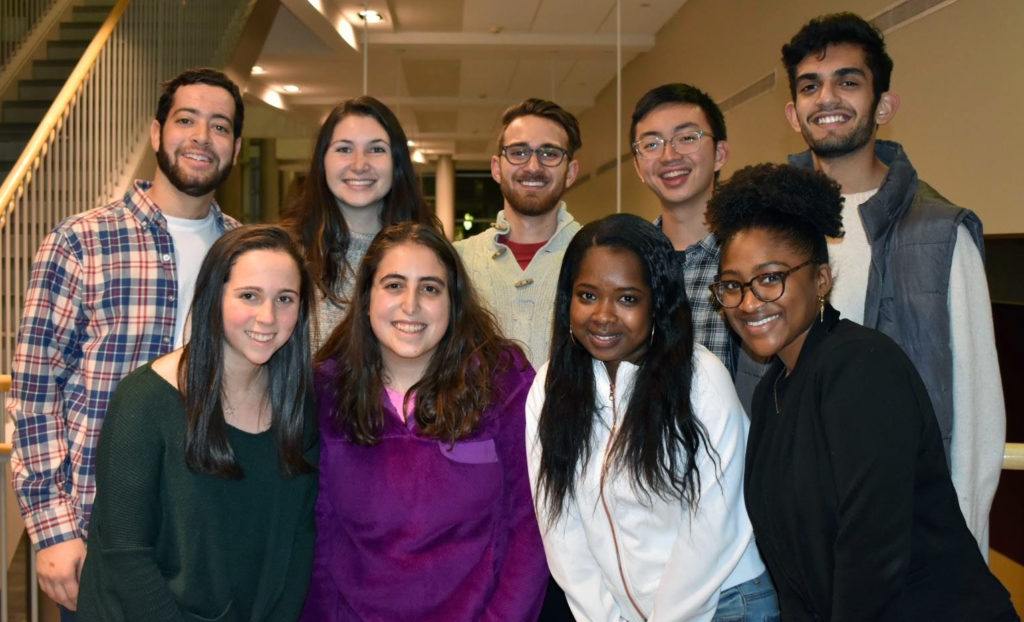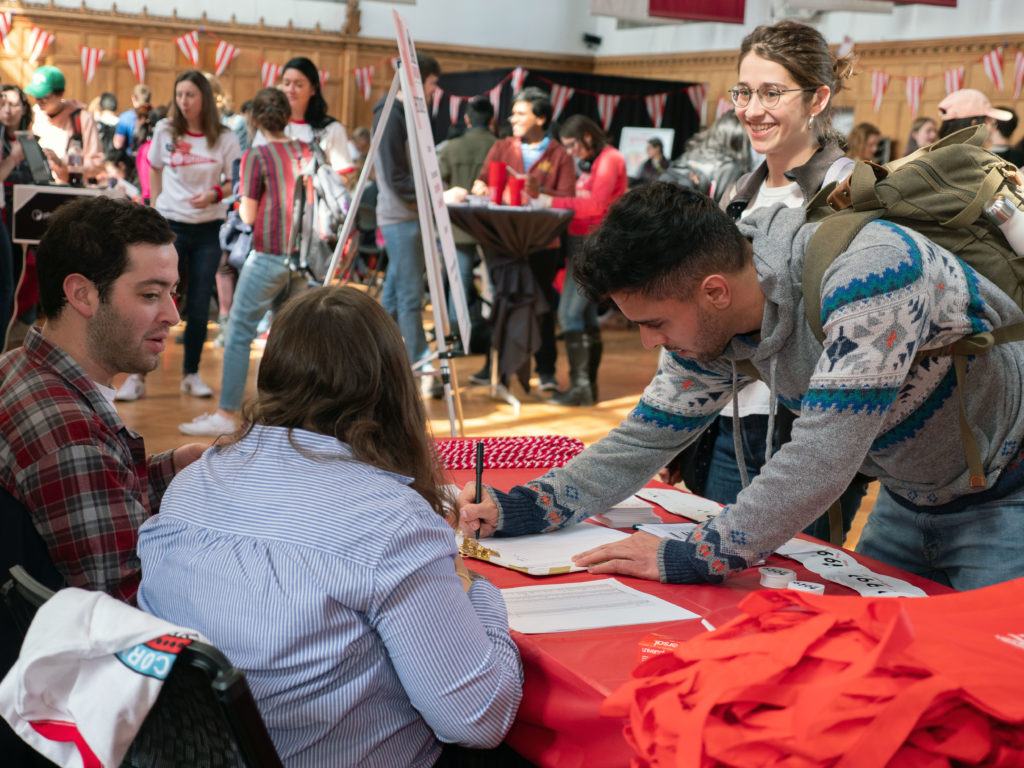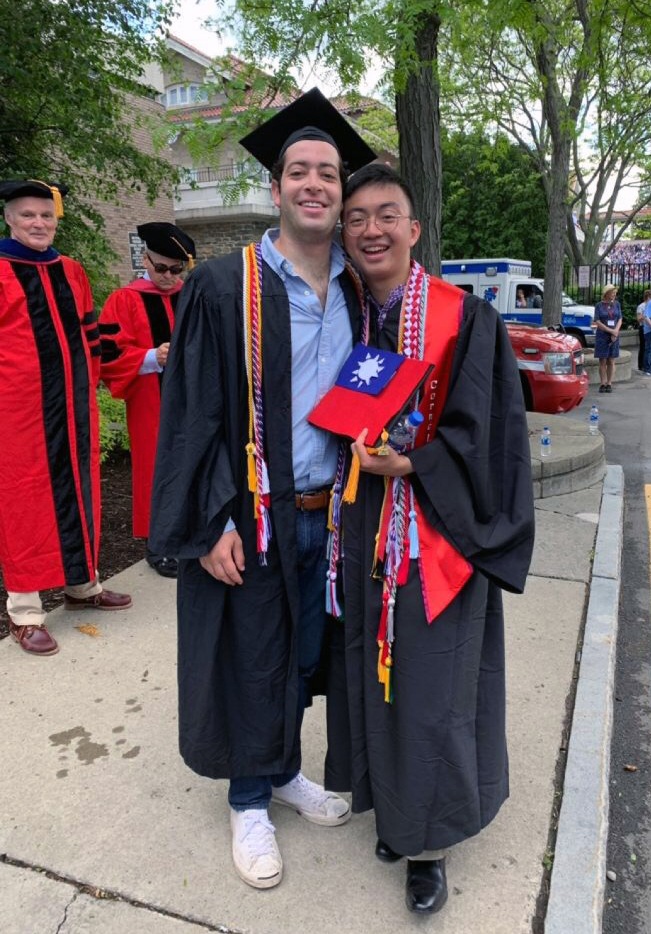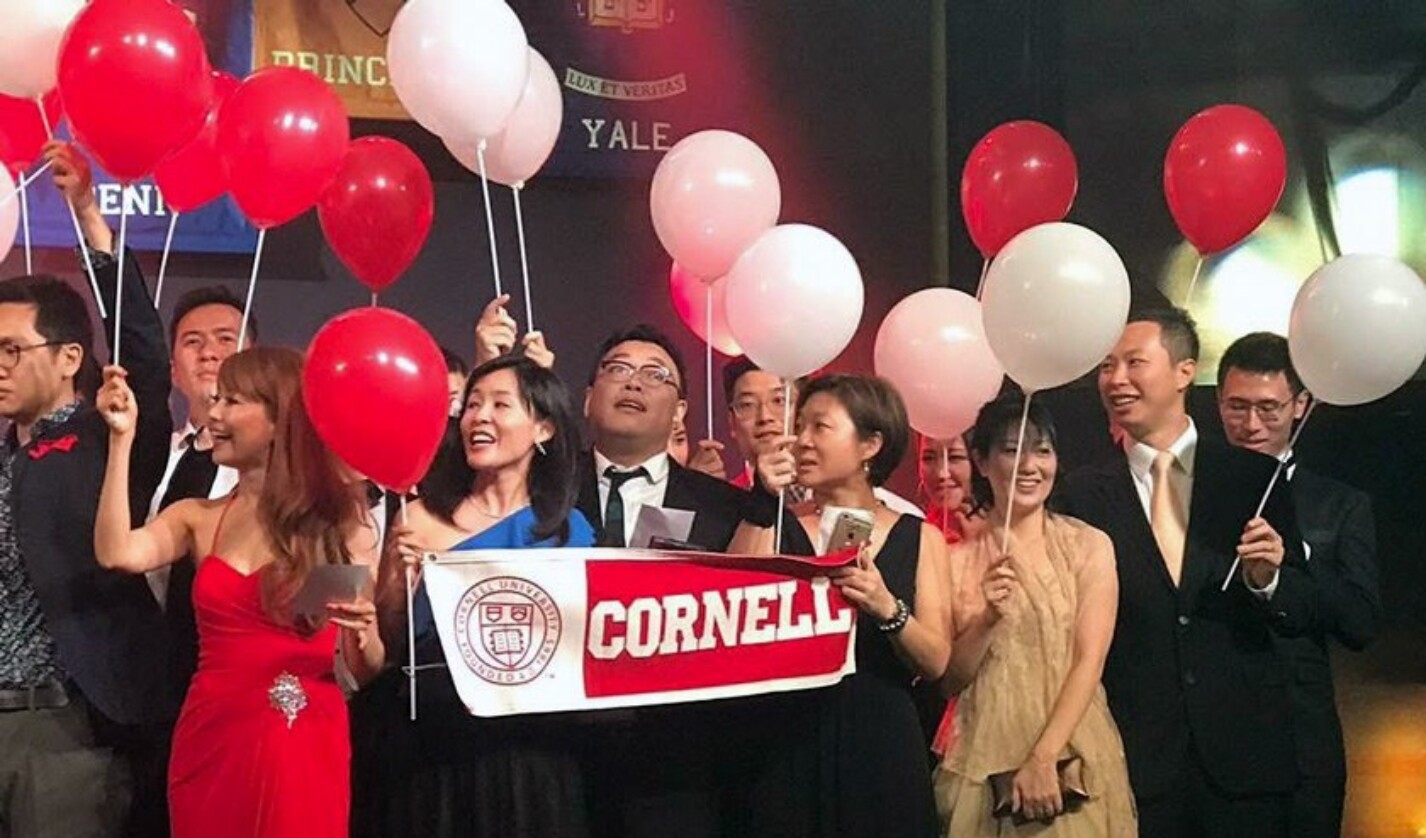The focus of the Senior Class Campaign (SCC) is on engaging as many seniors as possible in the tradition of giving. “Our message to seniors is, ‘Hey everyone, there is something at Cornell that you love,’” says Kendra Saldana ’12, assistant director of Young Alumni Giving at Cornell and staff advisor to the SCC student team. “The senior campaign lets you give to what you love.”
In 2019, nearly one-third of all graduating seniors made a gift to the campaign, a significant increase in participation over the past few years. According to Saldana, several factors combined to make this year’s campaign so successful.
One draw was the thank-you swag that was offered to every senior who gave. This year’s executive board chose to recognize donors with a red and white braided cord. Graduating seniors who made a gift could pick up their cords starting at the kickoff event in December 2018, and throughout the spring semester. More than 900 of the 1,128 seniors who contributed to this year’s campaign proudly wore their cords at graduation.
The SCC is formally spearheaded by seniors, who work with their staff advisor in Alumni Affairs and Development (AAD). In 2019, the campaign was led by a volunteer executive board that met weekly throughout the academic year. Two seniors, Dustin Liu ’19 and Sam Markiewitz ’19, served as co-chairs of the SCC executive board.

Building on a tradition of giving
Back in 1872, Cornell’s first graduating class inaugurated the tradition of class giving. Their gift consisted of 72 trees planted as a class memorial. For the next few decades, senior classes typically gave the university a portrait or other tangible gift.
With the creation of the Alumni Fund (today’s Annual Fund) in 1909, senior classes began contributing cash donations. “The terms ‘Senior Class Gift’ and ‘campaign’ started being used more regularly in the 1960s,” says Corey Earle ’07, Cornell history buff. Earle developed and teaches a course on the history of Cornell University, AMST 2001: The First American University, and frequently speaks to alumni and community groups on historical topics. “During that decade, there were lots of debates in the Cornell Daily Sun about what should be funded,” he recalls.
In recent years, the seniors have adopted a more individualized approach to giving. Today’s seniors have the option to give to the fund of their choice. Some choose to give to their colleges, while others give to specific beneficiaries, such as the Cornell Cinema, Women’s Ultimate Frisbee, or the library.
Hey everyone, there is something at Cornell that you love.
Senior class gifts in 2019 ranged from five dollars to two thousand five hundred dollars, and there were many ways to give, including cash, a charge to the student’s bursar bill, or—for the first time this year—making a gift with Venmo, a mobile payment service. The Venmo option was launched late in the year, in April 2019, but it was an instant success with seniors. More than 250 seniors used Venmo to give directly to the fund of their choice.

The students played a key role in advocating for the Venmo option. Venmo gifts come directly from the students, whereas bursar transfers could be drawing on funds provided by parents or other sources. “The executive board talked through the philosophy behind this,” says Saldana. “When seniors make a gift with their own money through Venmo, the board felt that they will be more likely to make that same philanthropic decision again in the future.”
Saldana explained that the 2018 SCC co-chairs directly advocated for this option at the May 2018 Board of Trustees meeting, where they requested that Cornell accept Venmo gifts. “Fred Van Sickle (vice president for Alumni Affairs and Development) was at that trustee meeting, agreed with the students, and supported their initiative,” Saldana explains.
Engaging person to person
Another big factor in the success of the senior class campaign was the in-person conversations that campaign leaders had with their classmates. “I was excited to see how much the executive board valued these conversations,” Saldana says.
The students were great at talking about why it’s important to give back.
The students believed that in order to inspire their peers to give, they needed to create opportunities to make personal connections. They did this by hosting several events throughout the course of the year. They formally kicked off the campaign with a Winter Gala celebration, to which all seniors were invited. Several smaller events followed, including tabling across campus, a hot chocolate bar, and a lemonade stand. Executive board members were in charge of crafting email blasts and social media posts to draw students to these events.

But it was the one-on-one conversations that really sealed the deal, according to Saldana. “The students were great at talking about why it’s important to give back,” she says.
Saldana spent time at the start of the year walking the executive board members through some fundraising basics. “The seniors all wanted to know why, if Cornell has a $7 billion endowment, would we still need gifts. I explained to them that only a small fraction of the endowment is paid out annually, and gifts make up the difference to fund their student experience.”
Knowing your audience
Saldana feels that the seniors are best qualified to drive their own campaign, because “they know their classmates and how they feel about Cornell.” Her role in the campaign is to provide logistical support—for example, making sure there are enough cups on hand to serve hot chocolate—and to offer fundraising expertise and resources to the students. But it is up to the students to raise the dollars, she explains.

When asked to reflect on their experience leading the campaign, co-chair Dustin Liu says, “SCC allowed me to see firsthand how impactful Cornell has been for students. It was heartwarming to hear the stories of how programs, people, spaces, and experiences have changed lives for the better—so much so that students are ready to give back.” Liu is now involved with CUGALA, Cornell’s LGBTQ alumni association.
Co-chair Sam Markiewitz says, “Being part of SCC enabled me see the impact that each Cornellian can make, regardless of where they may be in their life.” Markiewitz will serve as a volunteer on the Council on Young Alumni Philanthropy this coming year.
The campaign is just one way in which AAD seeks to engage with students, says Saldana. “We also want to let students know that, once they leave campus, there’s a welcoming Cornell community out there,” she says.
AAD invites new graduates to stay connected to Cornell by attending in-person events like Homecoming, as well as digital offerings such as Cornell Forbes 30 Under 30. “We are mindful of the fact that our graduates are in transition, so we invite them to update their contact information so that we can invite them to regional events close to where they live,” she says.





